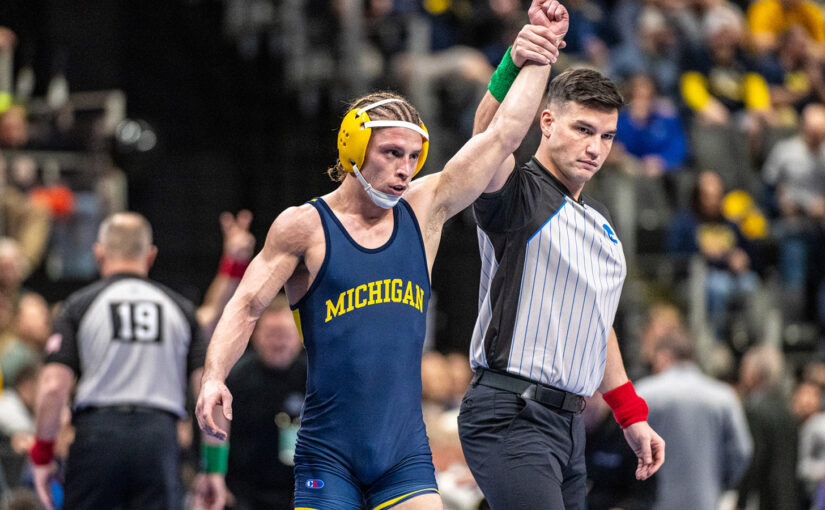Sep 13, 2023Interdisciplinary Collaboration in Wrestling
Wrestling is a sport that requires a unique combination of strength, speed, endurance, and agility. Wrestling athletes compete at specific weight classes, with wrestlers weighing in 1-2 hours prior to competition.
Nutrition is a critical component for wrestlers to perform at their best, and poor weight-making practices can become a concern for the safety of an athlete and inhibit their performance. Performance nutrition helps wrestlers fuel their bodies for intense training and competition, supports safe weight-making practices, and emphasizes the importance of a post-weigh-in fueling strategy for competition.
 This article will explore the importance of nutrition in wrestling and how interdisciplinary collaboration among registered dietitians, athletic trainers, strength and conditioning coaches, and team coaches can help support these athletes. Members from the wrestling performance team at the University of Michigan athletic department highlight some unique collaborative initiatives in wrestling and provide feedback relating to performance nutrition in the weight-class sport space.
This article will explore the importance of nutrition in wrestling and how interdisciplinary collaboration among registered dietitians, athletic trainers, strength and conditioning coaches, and team coaches can help support these athletes. Members from the wrestling performance team at the University of Michigan athletic department highlight some unique collaborative initiatives in wrestling and provide feedback relating to performance nutrition in the weight-class sport space.
From your perspective, how important is interdisciplinary collaboration in wrestling sport-specific care?
“I believe it is imperative to ensure a holistic approach to student-athlete health and welfare, and sporting performance,” says Mike Favre, M.Ed., MSCC, RSCC, CSCS, Director of Olympic Sports Strength and Conditioning at the University of Michigan Athletic Department. “Without proper nutrition, my ability to help the student-athlete achieve gains in the various physical performance variables is greatly limited at best.” University of Michigan Wrestling Head Coach Sean Bormet adds, “In a weight class sport such as wrestling, it is essential that everyone is on the same page. Each variable is a key component to physically and mentally being at the athlete’s best in training and competition.”
Interdisciplinary collaboration can include discussions of athletes making a change in weight class, performance goals, challenges with weight cuts or weight management, and referrals for injury. Here, the Registered Dietitian and Strength and Conditioning Coach might closely plan together a nutrition and training schedule for the athlete to make weight safely, gain lean body mass, or improve performance goals. The Registered Dietitian and Athletic Trainer may also collaborate during the NCAA weight certification process and for fueling around injury rehabilitation and recovery. “Collaboration is very important. All parties need to know what each other is doing in order to deliver the most comprehensive care,” says Joel Pickerman, MS, AT, ATC, CSCS, Associate Athletic Trainer for Wrestling, University of Michigan Athletic Department.
How do you feel about the cultural shift of nutrition and fueling in wrestling compared to previous years?
“This year our nutrition and fueling culture was the best it has ever been since I returned to Michigan in 2011-2012,” says Bormet. Some specific factors behind this included trust among student-athletes and staff, and increased knowledge of nutrition that is weight-class sport-specific which helps the student-athlete connect. Nutrition for wrestling and weight-class sports as a special interest among Registered Dietitians has grown over the past years, providing more opportunities. “The desire and need for this support service will continue to grow,” says Favre, who adds how fortunate they have been to have a staff that appreciates the need for specific nutrition education and support for their student-athletes. When it comes to fueling and hydrating when making weight, Pickerman points out how more awareness about the importance contributes to a shift. “Coaches are more likely to make referrals to a dietitian instead of just telling the athletes what they used to do to make weight.”

Where do you see collaboration between professionals advancing in the upcoming years?
At the NCAA level, a Wrestling Weight Management Program details the weight certification process for athletes to safely establish the weight class they will perform. This process includes assessments of weight, body composition, and urine-specific gravity. These measurements are within the competency of a dietitian, and Pickerman believes as it relates to collaboration, a “biggest thing with wrestling could be having the Sports Dietitian perform or be more involved with the weight certification process.” In a more general sense, nutrition has long been thought of as a differentiator in athlete preparation and performance. “I see the sharing of information, planning, and collaboration among the professions continuing to separate athletes and teams,” says Bormet. “The healthiest, fittest, and best fueled and energized teams have the advantage.”
What advice would you give to another professional working with wrestling and looking to collaborate further with your role on the team?
Collaboration itself suggests shared common goals. When working in high-performance sport, goals are typically most advantageous when they directly benefit the athlete’s performance and well-being. Favre supports reaching out and communicating a vision for collaboration. “I am always happy to do whatever I can to enhance the implementation of student-athlete health and welfare services, and the resulting performance enhancement of the student-athlete.” Bormet adds, “Bring expertise, enthusiasm, and be able to connect with wrestlers and coaches.”
 Objectively, Pickerman suggests the importance of intention with services offered. “Don’t just implement something or collect data unless you are going to use it to make decisions or change something. Keep it as simple as possible, make sure everyone is on board, and that it has the potential to evoke positive change.”
Objectively, Pickerman suggests the importance of intention with services offered. “Don’t just implement something or collect data unless you are going to use it to make decisions or change something. Keep it as simple as possible, make sure everyone is on board, and that it has the potential to evoke positive change.”
The collaboration between Registered Dietitians, Athletic Trainers, Strength and Conditioning, and Coaches is crucial to the success of a wrestling team and individual wrestlers. The future of collaboration may improve with professionals gaining additional knowledge regarding the sport, evidenced-based weight-making practices, and understanding the role of various professionals to result in team success.
Written by a Collegiate and Professional Sports Dietitians Association Registered Dietitian (RD). To learn more about sports nutrition and CPSDA, go to www.sportsrd.org.



